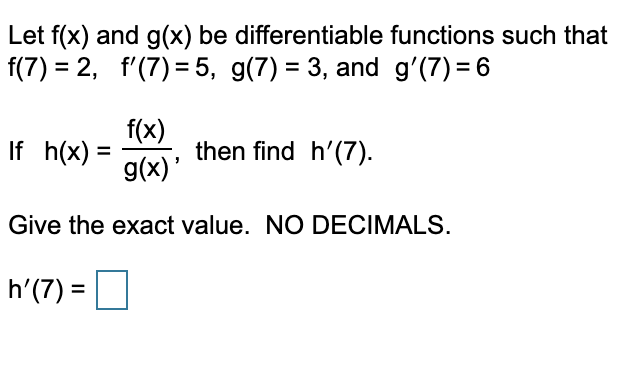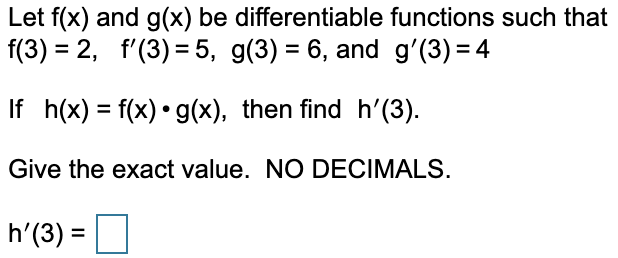Answered step by step
Verified Expert Solution
Question
1 Approved Answer
Let f(x) and g(x) be differentiable functions such that f(7) = 2, f'(7) = 5, g(7) = 3, and g'(7) = 6 f(x) then



Let f(x) and g(x) be differentiable functions such that f(7) = 2, f'(7) = 5, g(7) = 3, and g'(7) = 6 f(x) then find h'(7). g(x)' If h(x) = Give the exact value. NO DECIMALS. h'(7) = Let f(x) and g(x) be differentiable functions such that f(3) = 2, f'(3) = 5, g(3) = 6, and g'(3) = 4 If h(x) = f(x) g(x), then find h'(3). Give the exact value. NO DECIMALS. h'(3) = Let f(x) be a differentiable function such that f(2) = 4 and f'(2) = 5. If g(x) = x f(x), then find g'(2). Give the exact value. NO DECIMALS. g'(2) = Let f(x) and g(x) be differentiable functions such that f(7) = 2, f'(7) = 5, g(7) = 3, and g'(7) = 6 f(x) then find h'(7). g(x)' If h(x) = Give the exact value. NO DECIMALS. h'(7) = Let f(x) and g(x) be differentiable functions such that f(3) = 2, f'(3) = 5, g(3) = 6, and g'(3) = 4 If h(x) = f(x) g(x), then find h'(3). Give the exact value. NO DECIMALS. h'(3) = Let f(x) be a differentiable function such that f(2) = 4 and f'(2) = 5. If g(x) = x f(x), then find g'(2). Give the exact value. NO DECIMALS. g'(2) = Let f(x) and g(x) be differentiable functions such that f(7) = 2, f'(7) = 5, g(7) = 3, and g'(7) = 6 f(x) then find h'(7). g(x)' If h(x) = Give the exact value. NO DECIMALS. h'(7) = Let f(x) and g(x) be differentiable functions such that f(3) = 2, f'(3) = 5, g(3) = 6, and g'(3) = 4 If h(x) = f(x) g(x), then find h'(3). Give the exact value. NO DECIMALS. h'(3) = Let f(x) be a differentiable function such that f(2) = 4 and f'(2) = 5. If g(x) = x f(x), then find g'(2). Give the exact value. NO DECIMALS. g'(2) = Let f(x) and g(x) be differentiable functions such that f(7) = 2, f'(7) = 5, g(7) = 3, and g'(7) = 6 f(x) then find h'(7). g(x)' If h(x) = Give the exact value. NO DECIMALS. h'(7) = Let f(x) and g(x) be differentiable functions such that f(3) = 2, f'(3) = 5, g(3) = 6, and g'(3) = 4 If h(x) = f(x) g(x), then find h'(3). Give the exact value. NO DECIMALS. h'(3) = Let f(x) be a differentiable function such that f(2) = 4 and f'(2) = 5. If g(x) = x f(x), then find g'(2). Give the exact value. NO DECIMALS. g'(2) =
Step by Step Solution
★★★★★
3.43 Rating (150 Votes )
There are 3 Steps involved in it
Step: 1
w sC 2 5373 arnd 976 h a h a 339 NG ...
Get Instant Access to Expert-Tailored Solutions
See step-by-step solutions with expert insights and AI powered tools for academic success
Step: 2

Step: 3

Ace Your Homework with AI
Get the answers you need in no time with our AI-driven, step-by-step assistance
Get Started


